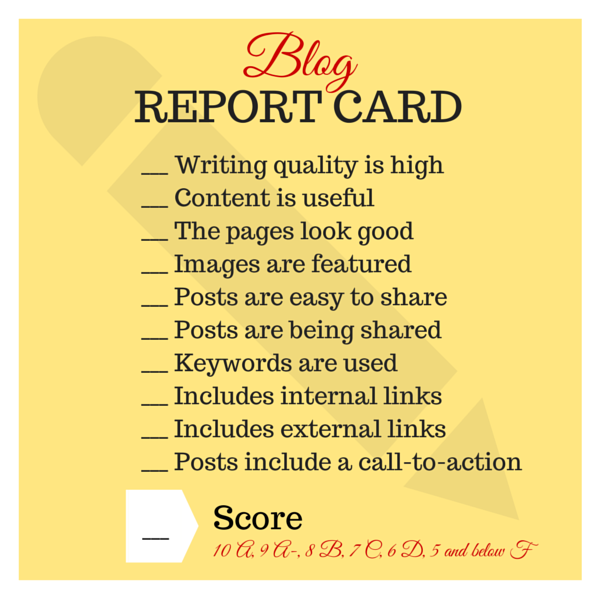I failed. Big fat F. But I’m giving myself a redo. I’m the teacher. I get to make that call.
Actually, for growing my business as a content marketing consultant, I’ll give myself a passing grade. It’s going well, but new (and tough) tests keep coming. I don’t ace ‘em all.
I have a new client that’s moving forward fast and furiously putting the pieces in place—new WordPress site, HubSpot, enewsletter, social media, collateral, the works. And they’re making a good size commitment to fueling inbound marketing efforts with a steady stream of content.
To help accelerate my ability to direct a kickass content marketing initiative, my client has given me an assistant. And she’s a go-getter. I can’t even move fast enough to push her because she’s pushing me.
In an effort to help the team blast through some initial planning stages, she created the spreadsheet that ate Cincinnati. I asked her to make one of its many tabs a rundown of competitors’ blogs, or prominent blogs in the field. She did that. It was a long list.
So then I asked her to try to save me some time by checking them out and grading them. (I figure I’ll only dig into the A and B material.) She graded them. I checked out the blogs she gave good grades. They didn’t deserve A’s and B’s. She was enormously generous.
I was thinking she failed me, but realized I’m to blame. I didn’t tell her how to grade the blogs—what criteria to use.
I got busy thinking it through a bit and along the way decided this would call for a simple and decisive blog report card. I think it’ll be helpful to her/us. I’m hoping it’s helpful to you too.
The blog report card criteria
When you peruse this report card, you’re bound to find some of the criteria I’m laying down as subjective. So be it. To keep it simple, the score can be either 1 or 0, so you need to make the call for the subjective ones, like #1…
1. Writing quality
The majority of business blogs do not feature high quality writing. More often than not, a read of a handful of posts suggests an exercise in blogging just to blog. When this happens, you can generally get a whiff of a “search first” mentality.
Look for posts that are fun to read and have a strong point of view. Ask yourself, “Would I subscribe to this blog?” Score 1 if the answer is yes. If you find yourself laboring to make it through the post, score 0.
2. Useful
The purpose of a business blog is to communicate useful information, content that will help the reader make smart decisions. If the posts you review reflect a commitment to teaching (instead of preaching) and you go away wiser, score another point.
3. Looks good
Design is critical to a blog. The pages need not qualify for design awards, but in an effort to create a pleasant reading experience and not fatigue the reader, the page should be laid out nicely. Subheads should make it easy to skim the page. Paragraphs should be short. The type should be attractive. There should be ample white space.
Put a zero on the report card if you find yourself swimming in a sea of continuous copy.
4. Images
Strike two on the visual front: blog posts with zero images. There should be at least one thoughtful and engaging image to draw you into each post. Longer posts should feature additional images to break up the story. Tutorial-style posts should feature a show-and-tell element to help you understand the lesson.
5. Easy to share
Do you find social media share buttons in an obvious place? Perhaps the blogger even included ready made tweets or suggested sharing the content. One point for the publisher who recognizes content marketing and social media make ideal mates. Zilch for the anti-social blog.
6. Earns shares
Look at the share counters. Are the posts being shared? Posts that are shared suggest the blog is serving a purpose.
What about the blogs that don’t include counters? Or what about the ones that do, but have mostly goose eggs? Is it unfair to dock a blog that’s new and not yet earning shares? It may be, but hey, if they otherwise ace this exam, they’ll earn a 9 or A-minus. Fair enough. Also, the host is welcome to share their posts—and should.
7. Keywords
The headlines of the article need to feature words or phrases that will appear in search results. Even a compelling title such as “This Secret Strategy Will Save You Thousands” fails on this front. No one will ever search for any terms in it. A good blog is attractive to humans and search bots.
8. Internal links
If you review multiple posts and find the host has neglected to create links to other posts or pages on their website featuring additional content, they get no point here. A good blog aims to increase engagement by extending your visit.
9. External links
Are you finding links to outside resources? You should. External links demonstrate the authors are doing research, citing their sources, recognizing experts, and aiming to build community.
10. Call to action
Business blogs support marketing efforts. If a reader hangs with you top to bottom, you did something right. If you neglect to direct them to a next step, you did something wrong—and missed a huge opportunity.
A variety of call-to-action types are good for a point:
- Leave a comment
- Read X or Y or Z
- Share this post
- Watch this video/demo
- Follow us on social media
- Try or buy our product
- Subscribe to our blog
Now add ‘em up
Given the demands of an effective blog, I suspect you’ll find very few perfect tens. Even A and B-grade blogs may be difficult to find. If you do find blogs worthy of a great report card, your efforts will have been worth it. You’ll have a source of inspiration—a model to aspire to.
If you find your competitors’ blogs earning bad grades, you can celebrate the opportunity to become a content marketing leader in your field.
Finally, if you score your own blog and fail to earn an A, get to work. Put in the effort. There’s a reason educators rely on report cards, right? When it comes to an important subject, it’s important to assess what you do and don’t know.
Help a fellow blogger out…
Any questions? Please ask. Are you a high-achieving blogger? If so, share your knowledge. Go ahead and suggest some ways to get an A and earn extra credit. I have several ideas, but I didn’t want to expect too much too soon. The point is to improve.







Comments
Brian Loebig
LOVE IT.